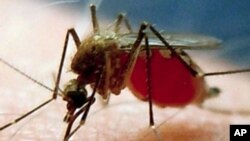A prominent Tanzania scientist has praised strides made by scientific research organizations to combat malaria in the country.
Dr. Hassan Mshinda, Director General of Tanzania Commission for Science and Technology, said the use of insecticide-treated nets by citizens has led to a sharp decline of malaria cases.
Health officials say malaria is a major health problem in Tanzania. He said the most effective interventions so far use insecticide-treated mosquito nets.
“These interventions have been shown to be effective…Studies which were conducted in several African countries provide proof of the concept that these mosquito nets work.”
Mshinda said the effectiveness of the treated mosquito led government to a policy to help improve the health conditions of Tanzanians.
“We moved into another stage of trying to see how we could also create a channel for the provision of these mosquito nets through a social marketing approach, which later on led into the development of the national strategy at the same time [encouraging] the private sector to start to invest more in the nets,” continued Mshinda.
“As a result, the number of nets in Tanzania has grown substantially. Today, more than 60 percent of children are sleeping under nets. In addition, under 5-[year old] children mortality has actually decreased substantially.”
A recently released report shows deaths caused by malaria in Tanzania has sharply reduced to almost 50 percent.
Dr. Mshinda said the treated mosquito nets have been effective in reducing malaria cases in Tanzania and other African countries.
“We see substantial reduction of deaths in children have now in many cases in Africa where coverage of mosquito nets is very high. What is more interesting for our country is that we are the leading bed net manufacturer in Africa,” said Mshinda.
Despite the reported success, some say residents in rural areas refuse to sleep under the treated mosquito nets because of what they claim to be a bad smell coming from them. Some Tanzanians living along bodies of water are also said to be using the nets for fishing.
Mshinda said Tanzanians seem to have embraced the idea of sleeping under nets to prevent malaria. He said the production of the nets have created jobs for citizens.
“We have built a network of retailers and wholesalers who are actually distributing nets to the people.”
Mshinda credits the government’s partnership with private organizations for the success of the mosquito treated net, which has sharply reduced malaria cases nationwide.
The Tanzania Commission for Science and Technology supports promotes and coordinates research. It is the custodian of government funding for research which it distributes to institutions.
Mshinda spoke on the topic of innovative financing and public and private funding strategies at the recent Council on Health Research and Development Group (COHRED) 2012 forum in Cape Town, South Africa.
Dr. Hassan Mshinda, Director General of Tanzania Commission for Science and Technology, said the use of insecticide-treated nets by citizens has led to a sharp decline of malaria cases.
Health officials say malaria is a major health problem in Tanzania. He said the most effective interventions so far use insecticide-treated mosquito nets.
“These interventions have been shown to be effective…Studies which were conducted in several African countries provide proof of the concept that these mosquito nets work.”
Mshinda said the effectiveness of the treated mosquito led government to a policy to help improve the health conditions of Tanzanians.
“We moved into another stage of trying to see how we could also create a channel for the provision of these mosquito nets through a social marketing approach, which later on led into the development of the national strategy at the same time [encouraging] the private sector to start to invest more in the nets,” continued Mshinda.
“As a result, the number of nets in Tanzania has grown substantially. Today, more than 60 percent of children are sleeping under nets. In addition, under 5-[year old] children mortality has actually decreased substantially.”
A recently released report shows deaths caused by malaria in Tanzania has sharply reduced to almost 50 percent.
Dr. Mshinda said the treated mosquito nets have been effective in reducing malaria cases in Tanzania and other African countries.
“We see substantial reduction of deaths in children have now in many cases in Africa where coverage of mosquito nets is very high. What is more interesting for our country is that we are the leading bed net manufacturer in Africa,” said Mshinda.
Despite the reported success, some say residents in rural areas refuse to sleep under the treated mosquito nets because of what they claim to be a bad smell coming from them. Some Tanzanians living along bodies of water are also said to be using the nets for fishing.
Mshinda said Tanzanians seem to have embraced the idea of sleeping under nets to prevent malaria. He said the production of the nets have created jobs for citizens.
“We have built a network of retailers and wholesalers who are actually distributing nets to the people.”
Mshinda credits the government’s partnership with private organizations for the success of the mosquito treated net, which has sharply reduced malaria cases nationwide.
The Tanzania Commission for Science and Technology supports promotes and coordinates research. It is the custodian of government funding for research which it distributes to institutions.
Mshinda spoke on the topic of innovative financing and public and private funding strategies at the recent Council on Health Research and Development Group (COHRED) 2012 forum in Cape Town, South Africa.





